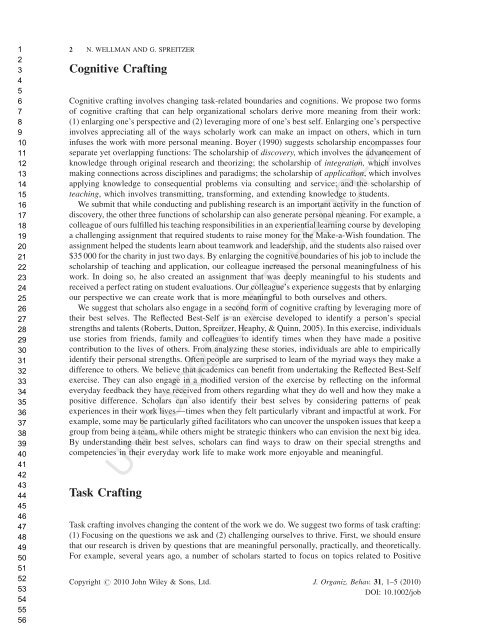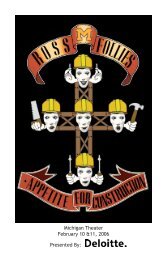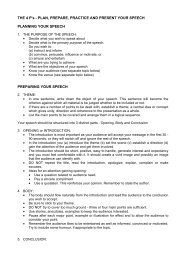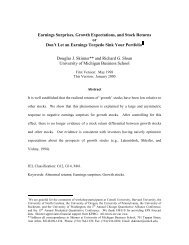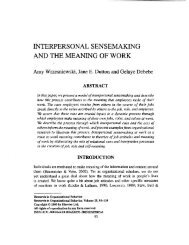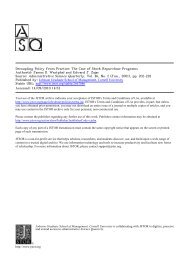proof of your article attached, please read carefully - Stephen M ...
proof of your article attached, please read carefully - Stephen M ...
proof of your article attached, please read carefully - Stephen M ...
Create successful ePaper yourself
Turn your PDF publications into a flip-book with our unique Google optimized e-Paper software.
1<br />
2<br />
3<br />
4<br />
5<br />
6<br />
7<br />
8<br />
9<br />
10<br />
11<br />
12<br />
13<br />
14<br />
15<br />
16<br />
17<br />
18<br />
19<br />
20<br />
21<br />
22<br />
23<br />
24<br />
25<br />
26<br />
27<br />
28<br />
29<br />
30<br />
31<br />
32<br />
33<br />
34<br />
35<br />
36<br />
37<br />
38<br />
39<br />
40<br />
41<br />
42<br />
43<br />
44<br />
45<br />
46<br />
47<br />
48<br />
49<br />
50<br />
51<br />
52<br />
53<br />
54<br />
55<br />
56<br />
2 N. WELLMAN AND G. SPREITZER<br />
Cognitive Crafting<br />
Cognitive crafting involves changing task-related boundaries and cognitions. We propose two forms<br />
<strong>of</strong> cognitive crafting that can help organizational scholars derive more meaning from their work:<br />
(1) enlarging one’s perspective and (2) leveraging more <strong>of</strong> one’s best self. Enlarging one’s perspective<br />
involves appreciating all <strong>of</strong> the ways scholarly work can make an impact on others, which in turn<br />
infuses the work with more personal meaning. Boyer (1990) suggests scholarship encompasses four<br />
separate yet overlapping functions: The scholarship <strong>of</strong> discovery, which involves the advancement <strong>of</strong><br />
knowledge through original research and theorizing; the scholarship <strong>of</strong> integration, which involves<br />
making connections across disciplines and paradigms; the scholarship <strong>of</strong> application, which involves<br />
applying knowledge to consequential problems via consulting and service; and the scholarship <strong>of</strong><br />
teaching, which involves transmitting, transforming, and extending knowledge to students.<br />
We submit that while conducting and publishing research is an important activity in the function <strong>of</strong><br />
discovery, the other three functions <strong>of</strong> scholarship can also generate personal meaning. For example, a<br />
colleague <strong>of</strong> ours fulfilled his teaching responsibilities in an experiential learning course by developing<br />
a challenging assignment that required students to raise money for the Make-a-Wish foundation. The<br />
assignment helped the students learn about teamwork and leadership, and the students also raised over<br />
$35 000 for the charity in just two days. By enlarging the cognitive boundaries <strong>of</strong> his job to include the<br />
scholarship <strong>of</strong> teaching and application, our colleague increased the personal meaningfulness <strong>of</strong> his<br />
work. In doing so, he also created an assignment that was deeply meaningful to his students and<br />
received a perfect rating on student evaluations. Our colleague’s experience suggests that by enlarging<br />
our perspective we can create work that is more meaningful to both ourselves and others.<br />
We suggest that scholars also engage in a second form <strong>of</strong> cognitive crafting by leveraging more <strong>of</strong><br />
their best selves. The Reflected Best-Self is an exercise developed to identify a person’s special<br />
strengths and talents (Roberts, Dutton, Spreitzer, Heaphy, & Quinn, 2005). In this exercise, individuals<br />
use stories from friends, family and colleagues to identify times when they have made a positive<br />
contribution to the lives <strong>of</strong> others. From analyzing these stories, individuals are able to empirically<br />
identify their personal strengths. Often people are surprised to learn <strong>of</strong> the myriad ways they make a<br />
difference to others. We believe that academics can benefit from undertaking the Reflected Best-Self<br />
exercise. They can also engage in a modified version <strong>of</strong> the exercise by reflecting on the informal<br />
everyday feedback they have received from others regarding what they do well and how they make a<br />
positive difference. Scholars can also identify their best selves by considering patterns <strong>of</strong> peak<br />
experiences in their work lives—times when they felt particularly vibrant and impactful at work. For<br />
example, some may be particularly gifted facilitators who can uncover the unspoken issues that keep a<br />
group from being a team, while others might be strategic thinkers who can envision the next big idea.<br />
By understanding their best selves, scholars can find ways to draw on their special strengths and<br />
competencies in their everyday work life to make work more enjoyable and meaningful.<br />
Task Crafting<br />
UNCORRECTED PROOFS<br />
Task crafting involves changing the content <strong>of</strong> the work we do. We suggest two forms <strong>of</strong> task crafting:<br />
(1) Focusing on the questions we ask and (2) challenging ourselves to thrive. First, we should ensure<br />
that our research is driven by questions that are meaningful personally, practically, and theoretically.<br />
For example, several years ago, a number <strong>of</strong> scholars started to focus on topics related to Positive<br />
Copyright # 2010 John Wiley & Sons, Ltd. J. Organiz. Behav. 31, 1–5 (2010)<br />
DOI: 10.1002/job


